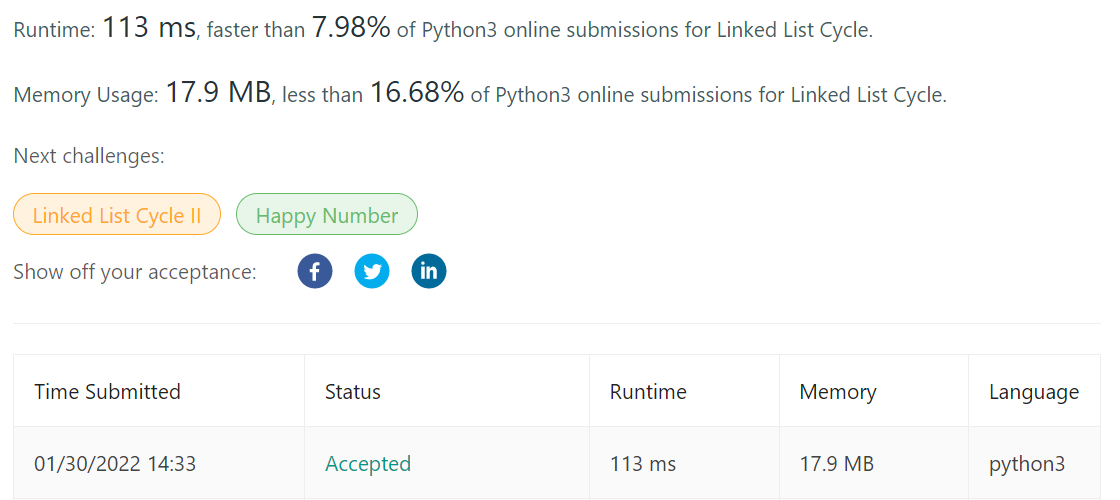

문제
- linke list에 cycle이 있으면 true 리턴
풀이
- 어차피 Node.next가 한 노드 밖에 연결하지 못하니까
- dfs로 탐색하며
- visited인 노드를 다시 만나면 true, 아니면 false
=> 문제가 발생했다. val 이 같아도 다른 node가 있는 것..
=> 같은 주소의 노드인지 판별해야한다
from collections import defaultdict
# Definition for singly-linked list.
# class ListNode:
# def __init__(self, x):
# self.val = x
# self.next = None
class Solution:
def hasCycle(self, head: Optional[ListNode]) -> bool:
if head:
visited = defaultdict(list)
thisNode = head
visited[thisNode.val].append(thisNode)
while thisNode.next:
nextNode = thisNode.next
if nextNode.val in visited:
for visitedValNode in visited[nextNode.val]:
if visitedValNode is nextNode:
# address compare
return True
visited[nextNode.val].append(nextNode)
thisNode = nextNode
return False예외처리
- input으로 None인 Node 들어 올 경우
-> if 처리
결과

너무 느리다 너무 느려
개선이 필요하다
id()를 이용해서 주소값을 비교하기
# Definition for singly-linked list.
# class ListNode:
# def __init__(self, x):
# self.val = x
# self.next = None
class Solution:
def hasCycle(self, head: Optional[ListNode]) -> bool:
if head:
visited = set()
thisNode = head
visited.add(id(thisNode))
while thisNode.next:
nextNode = thisNode.next
if id(nextNode) in visited:
return True
visited.add(id(nextNode))
thisNode = nextNode
return False
여전히 그닥 빠르진 않다;;;;
set() 대신 dict() 사용하기
class Solution:
def hasCycle(self, head: Optional[ListNode]) -> bool:
if head:
visited = dict()
thisNode = head
visited[id(thisNode)] = True
while thisNode.next:
nextNode = thisNode.next
if id(nextNode) in visited:
return True
visited[id(nextNode)] = True
thisNode = nextNode
return False
hash() 사용하기
무조건적으로 dict가 set보다 빠른건 또 아닌가보다...
class Solution:
def hasCycle(self, head: Optional[ListNode]) -> bool:
if head:
visited = set()
thisNode = head
visited.add(hash(thisNode))
while thisNode.next:
if hash(thisNode.next) in visited:
return True
thisNode = thisNode.next
visited.add(hash(thisNode))
return False
hash()는 python의 내장함수- hash 값 리턴함 -> 다른 객채면 다른 hash 갖고, 같은 객체면 같은 hash 갖을 것.
